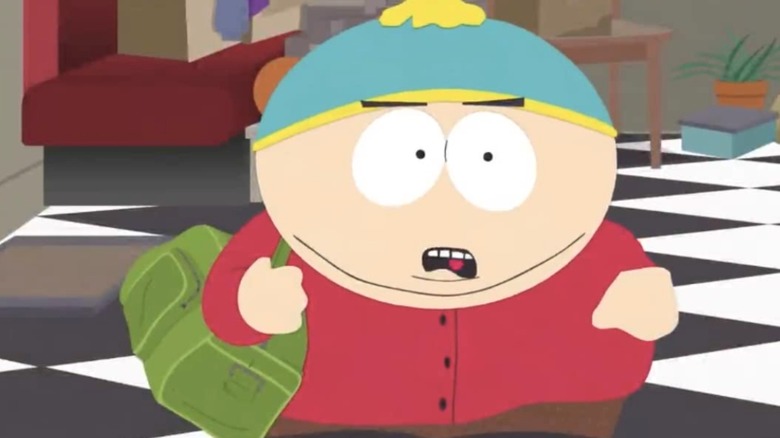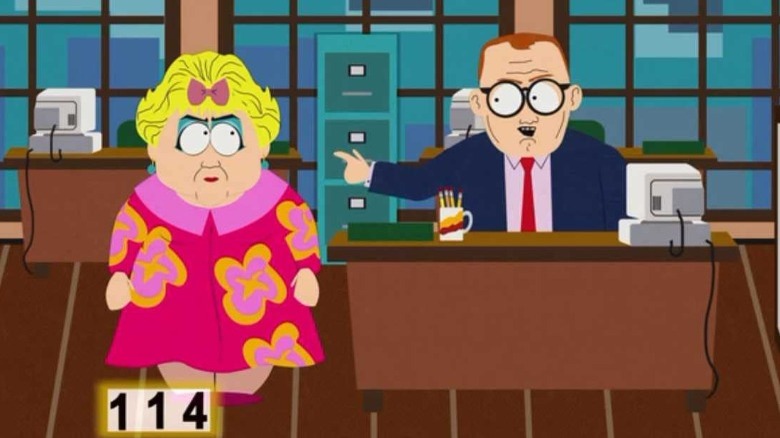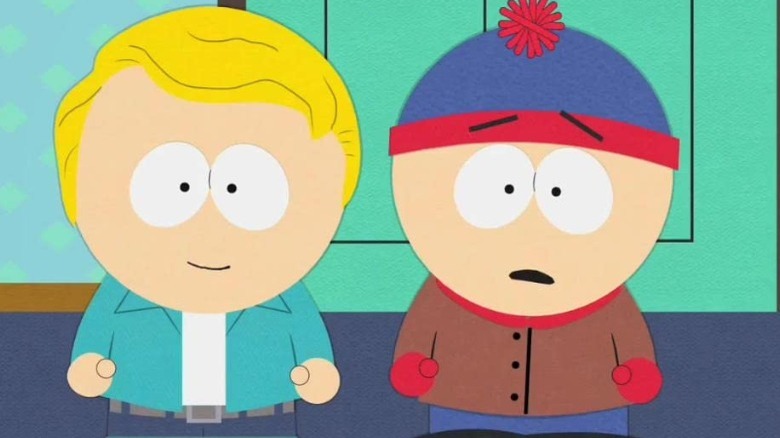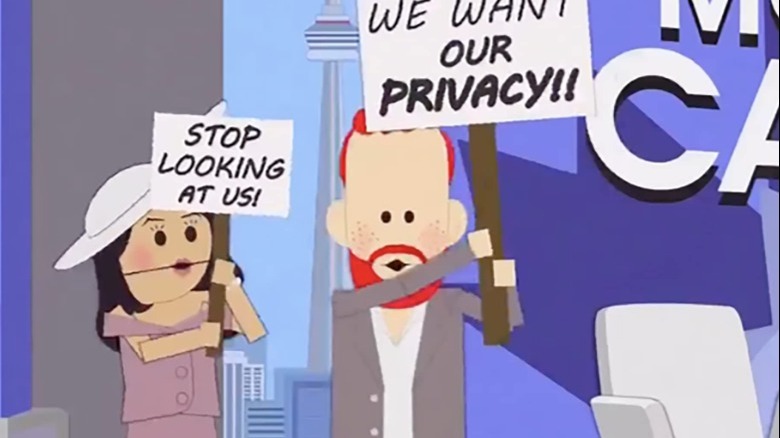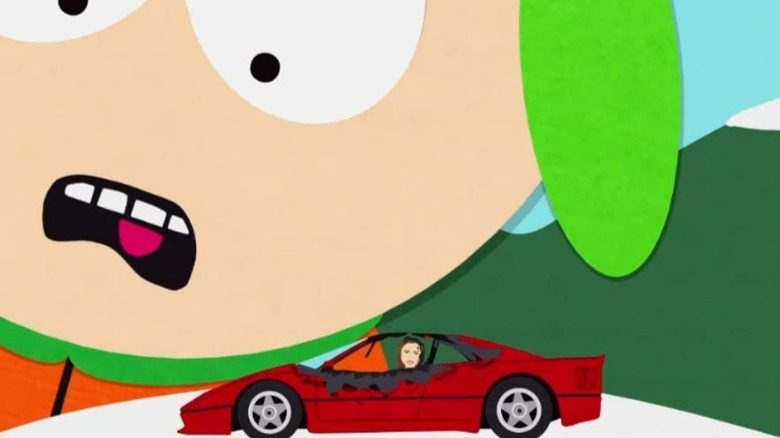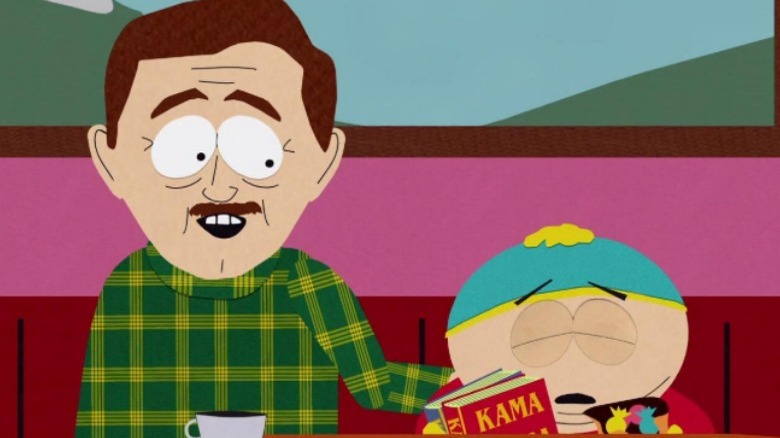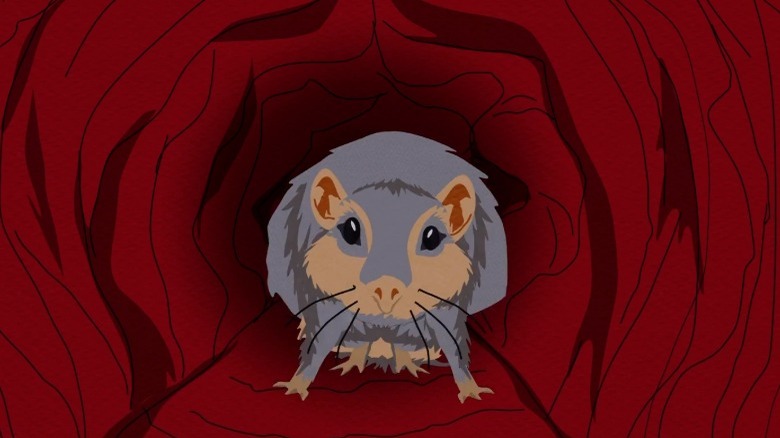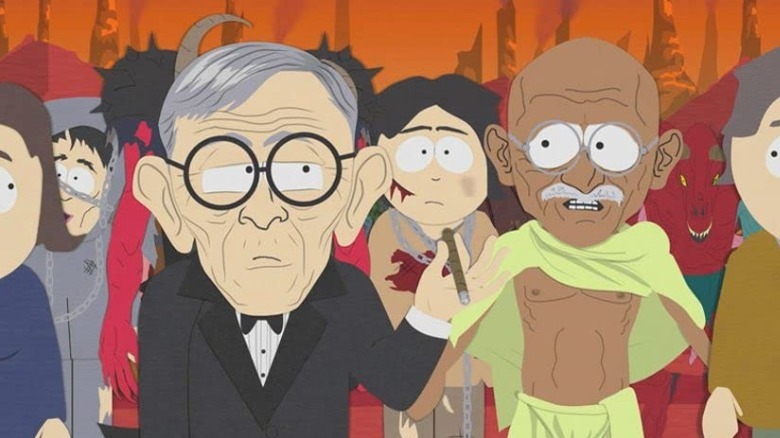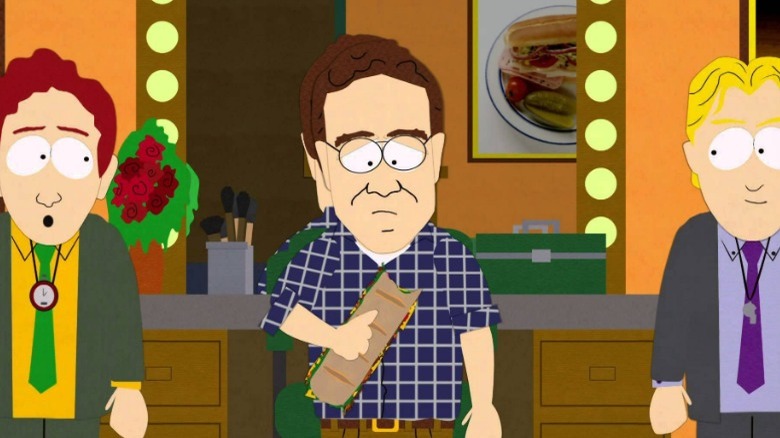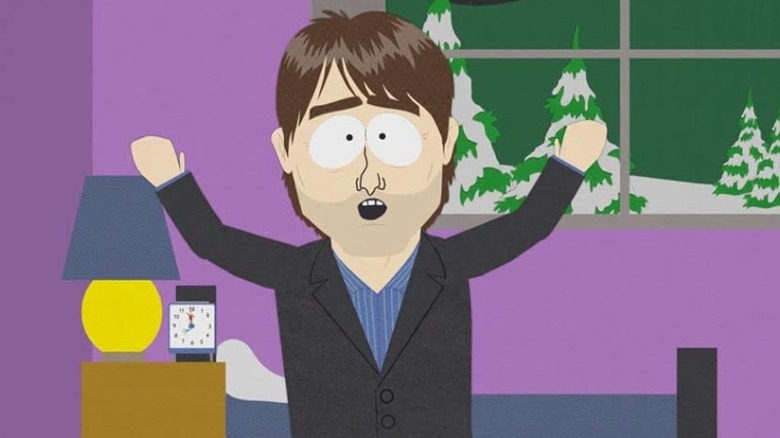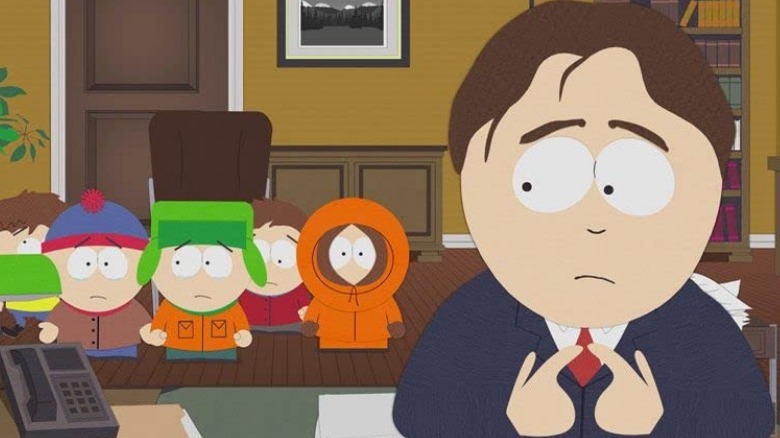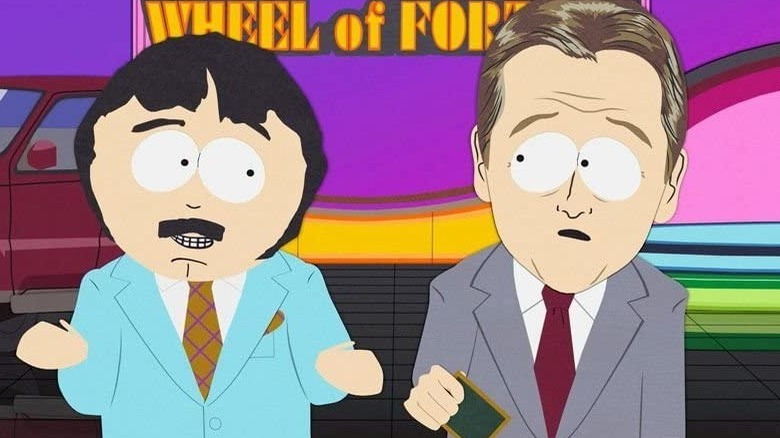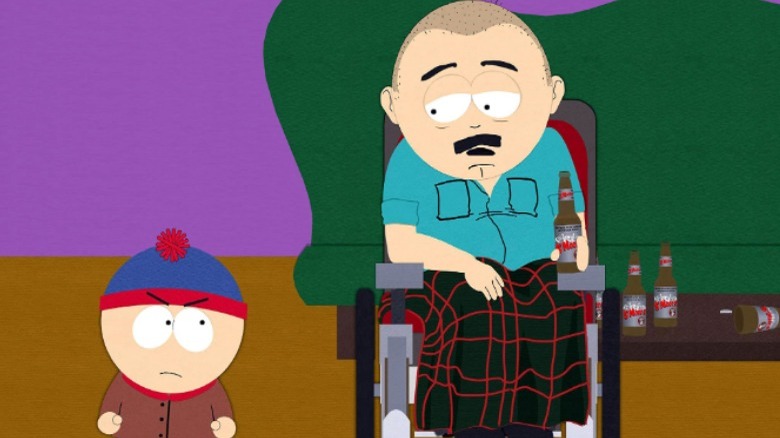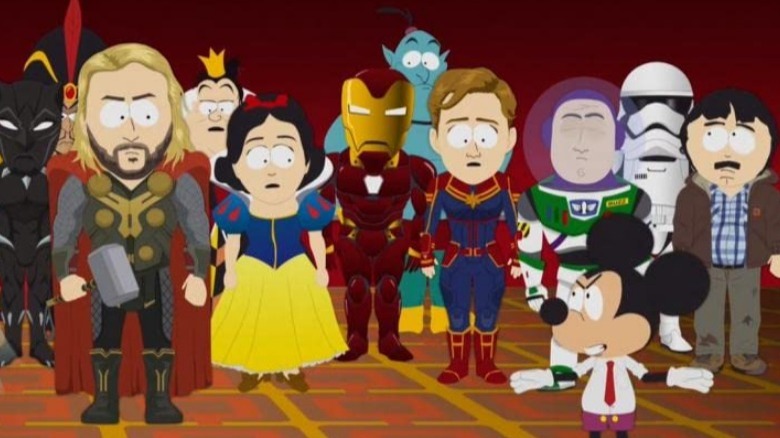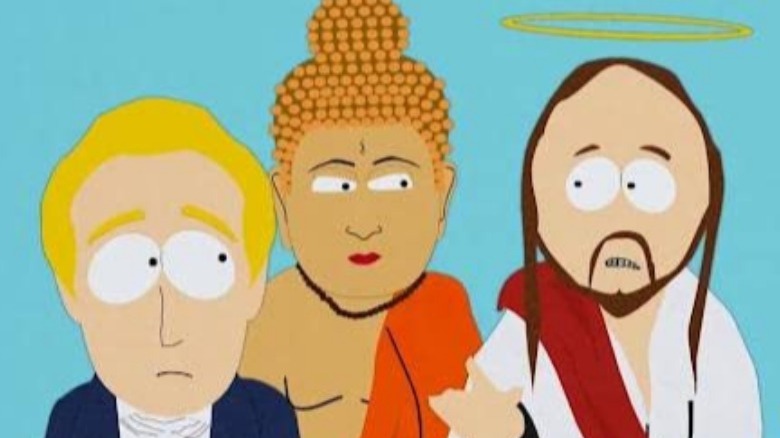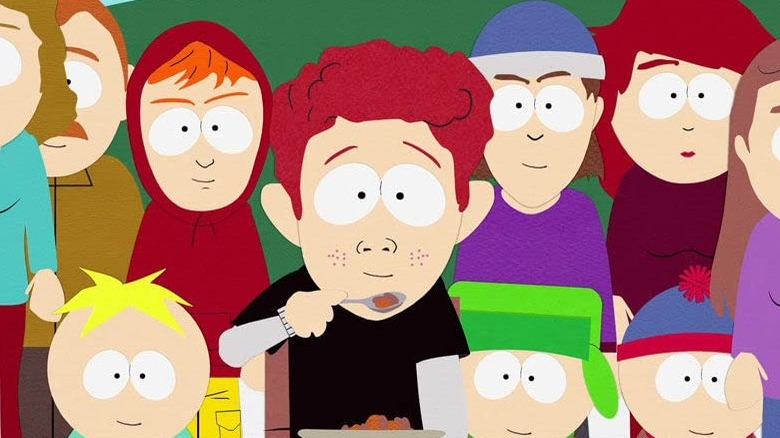South Park's 15 Most Controversial Episodes Ranked
First released in 1997, "South Park" changed the world of adult animation forever during the decades it's been on the air. Told through the perspective of pre-adolescents Kyle, Stan, Cartman, and Kenny, four friends growing up in the mountain town of South Park, Colorado, the profanity-laden series serves as a vehicle for its creators to satirically explore current events. Touching on everything from celebrity culture to politics, the creators of "South Park" freely go after ideas and behavior they deem extreme, often highlighting the absurdities in a way that others are afraid to while parodying celebrities by the droves. While a handful of good-spirited celebs – like Snooki – took the lampooning in stride, many struggled to find the humor in it.
No subject matter is safe from creators Trey Parker and Matt Stone, and controversy is ingrained so heavily in the series as to warrant an entire Wikipedia page addressing the topic. Come on down to South Park, because we're ranking the top 15 most controversial episodes.
15. It Hits the Fan
One of the most frequently lobbed complaints about "South Park" centers around the show's frequent and gratuitous use of profanity. With episodes like the show's pilot, "Cartman Gets an Anal Probe," it's hard to imagine anyone complaining about the language in any one specific "South Park" episode. But there's always someone around to clutch a few pearls whenever the show breaks a new taboo, as it did in the Season 5 opener "It Hits the Fan" — even if it was ground that had already been broken by the hit medical drama "Chicago Hope" in 1999 ("Vigilance and Care").
In the DVD commentary for the episode, the creators said they were inspired by the perception that profanity in dramatic programs was considered "bold and artistically forward-thinking" while seen as "low-brow" in shows like "South Park." When they approached Comedy Central with designs on using the S-bomb, the network initially nixed the idea but was intrigued when Trey and Matt countered with a rather novel idea: "What if we say it like 200 times?" To drive the point home, they added a counter to track how many times the word was used, coming in at a grand total of 162 times. While the episode generated a few thousand angry emails from the usually anti-"South Park" conservative groups, it wasn't all that controversial in a broader sense, and even garnered praise from many critics for the show's willingness to question the arbitrary nature of Standards and Practices.
14. All About Mormons
As Coloradoans living a stone's throw from Mormon country, "South Park" creators Trey and Matt grew up around Mormonism, with Stone telling The Hollywood Reporter he had long dreamed of exploring the subject matter. It's a dream the pair fully brought to life with their 2011 Broadway musical "The Book of Mormon," which went on to win nine Tony Awards and in 2022, became the 13th longest-running Broadway show. But long before Elder Price's heartfelt solo, the friends explored the faith in a no-holds-barred episode of "South Park" that finds Stan befriending a new kid in school who just happens to be Mormon.
As Stan gets to know Gary and his entirely wholesome family, the Harrisons, they begin sharing teachings from their Mormon doctrine, beginning with Joseph Smith's claims that he encountered the angel Moroni. With the help of 19th-century flashbacks set to a cheery musical number with the refrain, "Dum, dum, dum, dum, dum!," the episode emphasizes some of the faith's lesser-known beliefs and questions Joseph Smith's sincerity while conceding that Mormons can be some pretty nice folks. The Church of Latter-Day Saints was predictably annoyed with the presentation, dismissing the episode as a "gross portrayal of Church history" but emphasizing that the episode "inflicted no perceptible or lasting damage to a church that is growing by at least a quarter of a million new members every year."
13. The Worldwide Privacy Tour
Although there once was a time when the lives of British royals were the hottest gossip in town, these days, their relevance is waning. But that hasn't stopped Prince Harry and his wife Meghan Markle from keeping themselves front and center in the British and American press. After British tabloids did their worst, launching everything from false insinuations about Markle's PornHub activity to racially-charged language about Markle's biracial heritage, the couple made the understandable announcement that they'd be stepping back from public life and moving to the United States. There, they launched into a near-constant stream of interviews and public appearances, including their own Netflix docuseries and a memoir from Harry lamenting their treatment by the royal family — making them a perfect target for "South Park."
"The Worldwide Privacy Tour" revolves around the Prince of Canada and his wife, who happen to be ringers for Meghan and Harry. After burning bridges up north, they move to South Park as part of their rebranding campaign: A Worldwide Privacy Tour that involves a whole lot of claiming victimization while ironically victimizing just about everyone they come into contact with. Like everything Trey and Matt do, the episode is a scalding takedown of what Harry and Meghan's critics characterize as oblivious behavior from a couple mired in privilege. After the episode aired, several sources claimed Markle was "upset and overwhelmed" by the episode and even considering litigation — claims their publicist would later call "baseless" in a statement to People.
12. Proper Condom Use
How sex education should be taught in schools is one of those enduring controversies that continues to make news from one generation to the next. After the fifth graders trick Cartman and friends into masturbating a dog, Stan's parents are horrified but unwilling to broach the subject of sex ed, instead passing the buck to the kids' school. Unfortunately, the teachers and administration prove equally inept at teaching the content, passing on such bad information that the boys and girls end up at war with each other.
As expected, the episode deals with its subject matter in fairly graphic terms, particularly during a scene where Mr. Garrison teaches the correct technique for putting on a condom using his mouth. On the audio commentary for Season 5, the creators said the network told them to remove six to eight frames with Mr. Garrison's mouth touching the "model." After arguing extensively over whether the joke would work without it, they opted to leave this detail in, hoping to sneak it past the network. The plan didn't work, and they were made to remove the offending material.
11. Cartman Joins NAMBLA
As an animated series where no topic is off limits, it should come as no surprise that "South Park" decided to go after pedophiles in "Cartman Joins NAMBLA." The episode in question finds Cartman setting out to replace his friends with a more mature crew. When his online efforts keep leading him to Internet predators, Dr. Mephesto recommends Cartman join NAMBLA, the North American Marlon Brando Look-Alikes.
Although he successfully joins the organization, quickly becoming the group's poster boy, what Cartman doesn't realize is that he's accidentally signed onto the North American Man-Boy Love Association — a real group that does exactly what it sounds like it does. The theme of SA plays heavily into the episode, making for some of the show's most indelicate content — which is really saying something with a show like "South Park." If that wasn't enough for the pearl-clutchers, the episode also features a storyline dealing with Kenny's efforts to abort his expectant mother's pregnancy. Despite the controversial content, the episode was considered a favorite among fans of the series.
If you or someone you know may be the victim of child abuse, please contact the Childhelp National Child Abuse Hotline at 1-800-4-A-Child (1-800-422-4453) or contact their live chat services.
10. The Death Camp of Tolerance
You know "South Park" has crossed a line or two when during an audio commentary, even friends of the show's creators call an episode "the most f*****-up thing I've ever seen." After learning that a discriminatory firing could score him a hefty payout, Mr. Garrison sets his sights on getting fired for being gay. And in doing so, the series unleashes a steady stream of questionable content for viewers' edutainment. In his effort to crank the gayness up to 11, Garrison begins a campaign of inappropriate behavior with his new classroom assistant Mr. Slave, an overtly gay leather daddy ripped straight out of the Blue Oyster Club.
When the school staff proves surprisingly tolerant of Mr. Garrison's homosexuality, he pulls increasingly shocking in-classroom stunts, at one point using the class gerbil Lemmiwinks in a particularly egregious way. Once inside Mr. Slave's body, Lemmiwinks finds himself on an epic journey akin to "Lord of the Rings." As Matt and Trey recount in the audio commentary for the episode, the material proved so shocking that the other animators believed it was meant to be a placeholder to be removed before completion. While viewing the animatics, no one other than Trey and Matt were amused. But that didn't stop the animators from laughing at their own joke, even suggesting they'd considered making a live-action companion to the story — something it's probably best not to consider too closely.
9. Hell on Earth 2006
As an equal opportunity offender, "South Park" is pretty clear that everyone is fair game for their target practice — untimely, tragic deaths included. But many viewers felt the series went just a little too far when they poked fun at the horrific death of wildlife expert Steve Irwin. Known as "the Crocodile Hunter," the Australian conservationist, animal lover, and TV star made an international celebrity of himself with his animal-fueled antics, often getting up close and personal with some pretty toothy critters. His upbeat personality and contagious love of animals were responsible for introducing an entire generation to the wonders of wildlife. But while shooting footage for a documentary in 2006, Irwin was suddenly killed in a rare unprovoked stingray barb attack.
"South Park" lampooned the death less than two months later in a brief but shocking gag that featured Irwin as a party guest at Satan's Halloween costume party — stingray barb and all. When it's brought to Satan's attention that the Croc Hunter is out of costume, Irwin is booted from the party, whose other guests include the likes of George Burns and Gandhi. The backlash to the episode was swift, with the BBC reporting that friends of the Irwin family called it "distasteful" while expressing concern about the impact on the Irwin children.
8. Jared Has Aides
As huge proponents of free speech, Trey Parker and Matt Stone are constantly butting heads with the powers that be in their efforts to get content on the air. The Subway-lampooning "Jared Has Aides" is a reminder that as often as not, the reasons for censorship are financially rather than morally motivated — after all, networks have to keep the lights on somehow. Around the turn of the millennium, Jared Fogle became famous for the dramatic weight loss he attributed to a diet of Subway sandwiches, a claim the fast food company was quick to capitalize on. Soon, Jared-centered Subway ads were ubiquitous, despite many critics wondering if it was a good idea to link Subway subs to weight loss.
Annoyed with the advertisements and suspicious there could be a dishonest element to Jared's relationship with Subway, Trey and Matt developed a storyline where Jared's weight loss is attributed to help from aides, something the South Park kids mishear as "AIDS." In response to the episode, Subway corporate issued a press statement distancing the company from the content. It's hard to imagine that no execs regretted this response when the world learned of Fogle's arrest on charges of child pornography and child sex tourism.
7. Trapped in the Closet
It's no secret that Hollywood is full of celebrity Scientologists. Although several high-profile celebrities like Leah Remini and Laura Prepon have spoken out against Scientology over the past decade or so, the Church of Scientology frequently targets anyone who questions them, something outlined explicitly in founder L. Ron Hubbard's 1966 policy letter. After a couple of minor volleys at the religion with their short episode "The Gauntlet" and the David Blaine cult ("Super Best Friends"), "South Park" went after Scientology with both barrels in 2005's "Trapped in the Closet."
When Stan learns that he's the reincarnation of L. Ron Hubbard after a "free personality test," the episode reveals several true Scientology beliefs including the alien Xenu and thetans while airing the disclaimer, "This is what Scientologists actually believe." For music legend Isaac Hayes, who played Chef through many episodes openly mocking Christians, taking aim at Scientology while explicitly calling it "a big fat global scam" was a bridge too far. In a public statement announcing his departure, Hayes said, "There is a place in this world for satire, but there is a time when satire ends and intolerance and bigotry towards religious beliefs of others begins." Hayes' son later blamed the church, telling The Hollywood Reporter his dad had recently had a stroke and "really didn't have that much comprehension," emphasizing that "someone quit South Park on Isaac Hayes' behalf. We don't know who."
6. The China Probrem
Airing during Season 12 of "South Park," "The China Probrem" became one of the show's more notorious episodes for its handling of rape. Dedicated to Isaac Hayes, who died earlier that year, the episode finds Cartman creating the American Liberation Front to thwart what he believes to be an imminent Chinese invasion, while Kyle becomes increasingly preoccupied over what he calls "the rape of a friend." Through traumatic flashbacks, the assault is eventually revealed to be perpetrated by Steven Spielberg and George Lucas, who the boys witnessed raping Indiana Jones in his most recent film "Indiana Jones and the Kingdom of the Crystal Skull."
The imagery, which graphically parodies the rape scenes from "Deliverance," "A Clockwork Orange," "Boys Don't Cry," and "The Accused," proved to be a lot for even the most loyal of "South Park" fans, who took to "South Park" fan forums to complain. Summing up the sentiment of the offended, one viewer lamented, "The border between downright evil and morbid has been crossed many a time and I feel robbed of a show that brought me a lot of joy." As is always the case with "South Park," for every offended fan, there were others who loved the episode.
If you or anyone you know has been a victim of sexual assault, help is available. Visit the Rape, Abuse & Incest National Network website or contact RAINN's National Helpline at 1-800-656-HOPE (4673).
5. With apologies to Jesse Jackson
Vulgar language has always been part of the "South Park" DNA. But many critics of the show felt it crossed a line with the 2007 episode "With Apologies to Jesse Jackson," which used the unfiltered "n-word" a grand total of 43 times. The word initially shows up when Stan's dad Randy is a contestant on "Wheel of Fortune." The category given is "People who annoy you." The correct word is meant to be "naggers," but instead of guessing the missing "A," Randy takes the show in a more unfortunate direction. After Randy's initial gaff, the word gets turned around on him as he finds himself a famous pariah who is mocked and abused for his reputation as "the 'N-word' guy."
While the heavy use of the N-word was shocking enough to generate heavy media attention, with critics like Parent Television Council's L. Brent Bozell claiming the series exploited the controversy that arose when radio host Don Imus dropped an N-bomb while accusing supporters of the show of hypocrisy. But many viewers were quick to point out that the word was used primarily to mock Randy's racism. Appearing on CNN, the co-founders of the group Abolish the N-Word emphasized the importance of the show's message "about the power of this word and how it feels to have hate language directed at you."
4. Bloody Mary
Some of the show's most offensive episodes have to do with its portrayal of what's perceived as blasphemy, and because it's "South Park," every major religion gets its chance to shine over the course of the series. For Catholics, this moment takes place in the Season 9 episode "Bloody Mary." After a court-ordered AA meeting, Stan's dad, serial hypochondriac Randy Marsh, becomes fixated on the idea that drinking is beyond his control, leading to a downward spiral. When a local statue of the Virgin Mary begins bleeding from its nether regions, the town is bombarded with pilgrims in search of a good faith healing — and Randy is among them.
Although the episode is primarily taking aim at problems with the Alcoholics Anonymous practice of elevating magical thinking about individual responsibility, many Catholics were incensed by the subject matter. The Catholic League issued a press release insisting that Comedy Central's parent company Viacom issue a formal apology to the Catholic community and commit to retiring the episode permanently while omitting it from the show's DVD release. The League went on to directly address Catholic Viacom board member Joseph Califano, requesting he issue a "statement of condemnation" if these demands were not met. While the episode was omitted from the show's year-end marathon, the network refused to cave to the other demands. In their autoreply statement on the pressure campaign, Comedy Central Viewer Services later commented, "[I]t is our First Amendment right to poke fun at any and all people, groups, organizations and religions and we will continue to defend that right."
3. Band in China
If censorship in China ever seemed like a problem distant from the United States borders, that isn't the case anymore — a growing concern "South Park" deftly addressed in the Season 23 episode "Band in China." The episode specifically takes aim at the impact of censorship under the People's Republic of China (PRC) on American companies and media. Although freedom of speech is considered fundamental to the American way of life, more companies have been shaping their content to avoid bans in China and not risk losing out on all that money. In 2016, the PRC released a set of extensive new guidelines for movie content allowed in China banning, among other things, "overt admiration for Western lifestyles," "hedonism," and "putting stars, billionaires or Internet celebrities on pedestals." According to CNN, the list of banned items also includes celebrity kids, time travel, smoking, cleavage, tattoos, men's earrings, and South Koreans.
Tired of the China-friendly caving on free speech, "South Park" hit back hard with "Band in China," which features a host of American brands kowtowing to Xi Jinping's demands in pursuit of a payday. Heavily laden with Chinese contraband like Winnie the Pooh and the Dalai Lama, the episode was deemed so offensive by China's censors that it got "South Park" permanently banned from the nation and scrubbed from the Chinese Internet.
2. The Super Best Friends Trilogy
Airing in July 2001, "Super Best Friends" finds Stan seeking help with his efforts to stop David Blaine's new cult, "Blaintology." In his desperation, he turns to Jesus, who calls his Teen Titans-style group of deities known as the Super Best Friends. Several key religious figures are represented, including Krishna, Joseph Smith, Lao-Tse, Moses, and Muhammad. Although this meant depicting a cartoon version of the Islam prophet, the episode aired without garnering significant attention for the portrayal, even though some Muslim communities consider depictions of Muhammad blasphemous.
Beginning in 2005, radical Muslim groups began a campaign of death threats and violence in response to cartoons representing Muhammad, leading to a wave of self-censorship among many media sources. After addressing the controversy in the 2006 "Cartoon Wars" arc by teasing a reveal of the prophet, "South Park" doubled down with their 200th and 201st episode, with "200" promising Muhammad's return in the following episode. Before the second episode aired, extremist groups directly threatened Trey and Matt, with one organization warning they could end up like Dutch filmmaker Theo van Gogh, who was executed by a fanatical terrorist. Comedy Central wasn't willing to take the risk, and the episodes that aired were so heavily censored that some of the key monologues were almost entirely bleeped. The episodes have never been available since the original airing — particularly ironic given that the moral of the story arc revolves around the dangers of censoring free speech.
1. Scott Tenorman Must Die
Guest starring Radiohead as themselves, "Scott Tenorman Must Die" deals with the antagonistic relationship between Cartman and an older student named Scott Tenorman, who has the misfortune of getting on Eric's bad side. The drama begins when Scott sells Cartman a handful of pubes, claiming they'll help kickstart puberty. On the Season 5 audio commentary, Matt and Trey state that they originally believed the episode wouldn't be that good since they'd been working a lot and running out of ideas. But simplifying the episode and honing in on Cartman's depraved personality proved a winning move, as "Scott Tenorman" went on to become a favorite among critics and fans.
Inspired by a "Tom and Jerry" type back-and-forth, the fighting between Scott and Cartman increasingly escalates, culminating in Cartman killing and feeding Scott his parents in a move straight out of Shakespeare's "Titus Andronicus" before licking the teen's tears in celebration. Although fans loved it, Trey and Matt debated whether they should go that dark, since having a kid — even a kid as sociopathic as Cartman — serve a teen his own parents is pretty heavy material. For Cartman, the episode proved only the beginning of his reign of terror.
